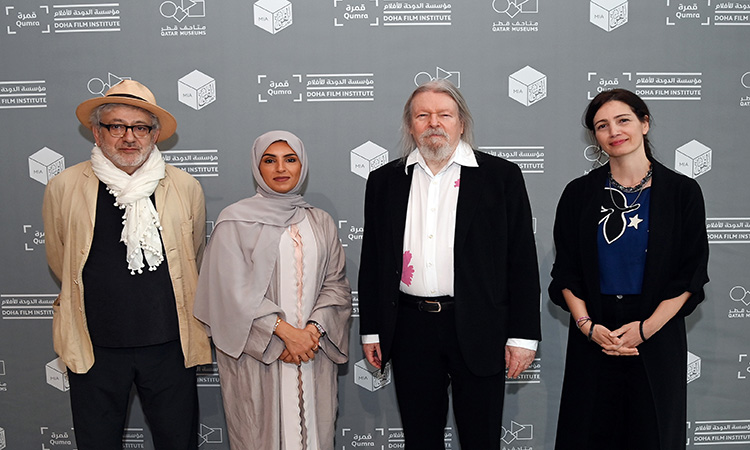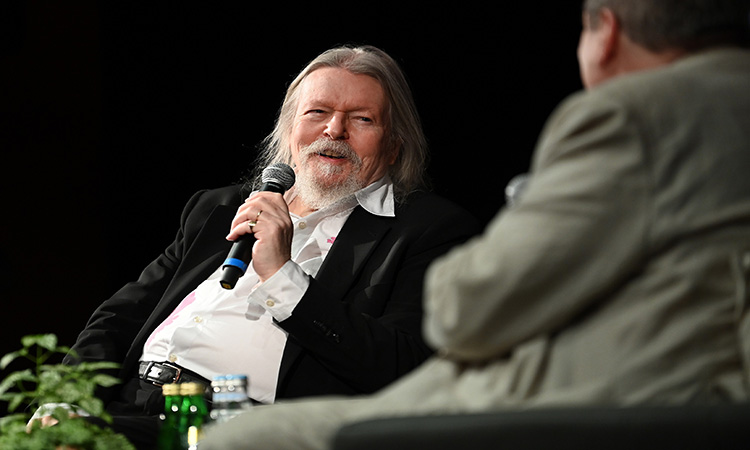Academy Award winning screenwriter and director Qumra Master Sir Christopher Hampton had a powerful message for emerging scriptwriters and directors: “See your film frame-by-frame in your mind as you write and focus on the power of storytelling. You can never write a film in approximations.”
Addressing the participants of his masterclass at Qumra 2023, the annual industry talent incubator event by the Doha Film Institute, Sir Hampton reiterated the need for paying attention to all the cinematic necessities right from the scripting stage, and underlined the need to have the best professionals, including actors and crew, to create an engaging film. “Hire the best people and then let them do their best and intervene as little as possible.”
“Many first-time directors make the mistake of trying to do everything, thinking they know everything and try to impose their personality into their projects,” observed Sir Hampton, who won the Academy Award for Best Adapted Screenplay for Dangerous Liaisons (1988), directed by Stephen Frears, and a second win in the same category for his screenplay and adaptation of Ian McEwan’s Atonement (2007), directed by Joe Wright.
Sir Hampton debuted as director with Carrington (1995) about the life of painter Dora Carrington, which he also wrote, as well as the visceral Imagining Argentina (2003) that explored the ‘forced disappearances’ of more than 30,000 people. With a distinguished ouvre spanning theatre and film, and a series, The Singapore Grip, he says he had “a wonderful life, doing what I wanted to do. There has been some bumpy bit along the road. There were setbacks and moments that you feel depressed.”
But the lesson he had to share from his own experiences with emerging talent, including actors, directors, and writers, is “to do a film, write a script, only when you really want to do it.” He said film schools play a good role in helping aspiring filmmakers understand the various departments in filmmaking, and it is important to have training across the spectrum.
Born in Portugal, Sir Hampton lived a good part of his childhood in Alexandria, Egypt, where he used to watch at least three movies a week with his father who was a great film enthusiast. “There were no restrictions and I used to watch every film that was coming out. Going to the movies, probably, made me want to be a writer.” This initial interest was deepened at the boarding school in England, where there were weekly film screenings, “and these films were extremely influential on everybody’s thinking at that time.”
Sir Hampton started his career at The Royal Court Theatre, because “theatre was very prestigious and gaining a lot of attention in London. It also seemed difficult to break into movies.” His breakthrough in films was with Dangerous Liaisons, based on his own play Les liaisons dangereuses, which again was adapted from the 1782 French novel by Pierre Choderlos de Laclos.
“It was such an amazing and insightful novel with a very modern sensibility,” says Sir Hampton. However, there was little interest in even staging it as a play, as the lead protagonists never meet in the novel, and theatre owners were not convinced that it would appeal to audiences. When Sir Hampton won a commission from the Royal Shakespeare Company, he decided to take the chance and make the play. Although planned to be staged at a swanky new theatre, it was demoted to a standard 150-seater theatre.
Sir Hampton calls that serendipitous, like the many strokes of luck, he says, that had defined his career. “The play worked so well in the smaller space and attracted enormously positive reviews,” he says. He held on the play’s film rights, and soon would enter a race against time to make into a film with Miloš Forman, the formidable director of One Flew Over the Cuckoo's Nest, also expressing his desire to make the novel a film. Shot and screened in less than seven months, the film was a break-out moment for Sir Hampton in international cinema.
Looking back, he says: “We – in cinema – are in such a serendipitous business. As it often happens in our industry, a series of miracles led to the film [Dangerous Liaisons] being made possible.” He says he was on set during the shoot, a process he likes, unless he feels his directors are uncomfortable with his presence.
Making Carrington, Sir Hampton says, was not an easy journey either. From script to screen, it took 18 long years. Highlighting the value that talented professionals bring to a project, he observes that working with Denis Lenoir, the French cinematographer, gave the film a distinctive look and feel. “Lenoir used a technique called flashing, which gave the film a milky sheen and the characters progressively growing older organically without using makeup.”
Sir Hampton also shared his memorable experiences of working on ‘Imagining Argentina,’ based on a novel that dealt with a heart-wrenching subject in an imaginative, magical realistic manner. He had to navigate through interventions by over 11 producers, including a total reedit that was ordained by them, and having to introduce an opening credit sequence only at the behest of another.
While there were scripts that eventually made it to the big screen, Sir Hampton says there is also a large section of films in his life that are ‘invisible’ - never been made. One such was Nostromo, that was all set to go on floors, but did not materialise with the passing of Sir David Lean, who invested many years in the project. But his acquired many invaluable lessons.
“I learnt to shape the power of the narrative and of putting scenes together. It also made me realise what one must take into consideration as a scriptwriter – and that is not just the script but everything that makes a film. You must treat your script with deadly seriousness and during the process of writing, it should consume you, thinking about nothing else.”




